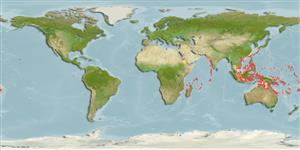Hexacorallia |
Scleractinia |
Faviidae
Environment: milieu / climate zone / depth range / distribution range
Ecology
Reef-associated; depth range 0 - 40 m (Ref. 848). Tropical; 36°N - 31°S, 34°E - 137°W (Ref. 848)
Indo-Pacific.
Length at first maturity / Size / Weight / Age
Maturity: Lm ? range ? - ? cm
Cream or light brown in color, often with a bright green center.
In shallow reef environments. On subtidal rock and rocky reefs, on back and foreslope, in lagoons, outer reef channel (Ref. 98471).
Life cycle and mating behavior
Maturity | Reproduction | Spawning | Eggs | Fecundity | Larvae
Hermaphroditic (Ref. 113712). Mature gametes are shed into the coelenteron and spawned through the mouth. Life cycle: The zygote develops into a planktonic planula larva. Metamorphosis begins with early morphogenesis of tentacles, septa and pharynx before larval settlement on the aboral end (Ref. 833).
Veron, J.E.N. and G. Hodgson 1989 Annotated checklist of the hermatypic corals of the Philippines. Pacific Science 43:234-287. (Ref. 8817)
IUCN Red List Status
(Ref. 130435: Version 2025-1)
CITES status (Ref. 108899)
Not Evaluated
Threat to humans
Human uses
| FishSource |
Tools
More information
Trophic EcologyFood items (preys)
Diet composition
Food consumption
Predators
Population dynamicsGrowth
Max. ages / sizes
Length-weight rel.
Length-length rel.
Length-frequencies
Mass conversion
Abundance
PhysiologyOxygen consumption
Human RelatedStamps, coins, misc.
Internet sources
Estimates based on models
Preferred temperature
(Ref.
115969): 24.6 - 28.9, mean 27.5 (based on 338 cells).
Price category
Unknown.
